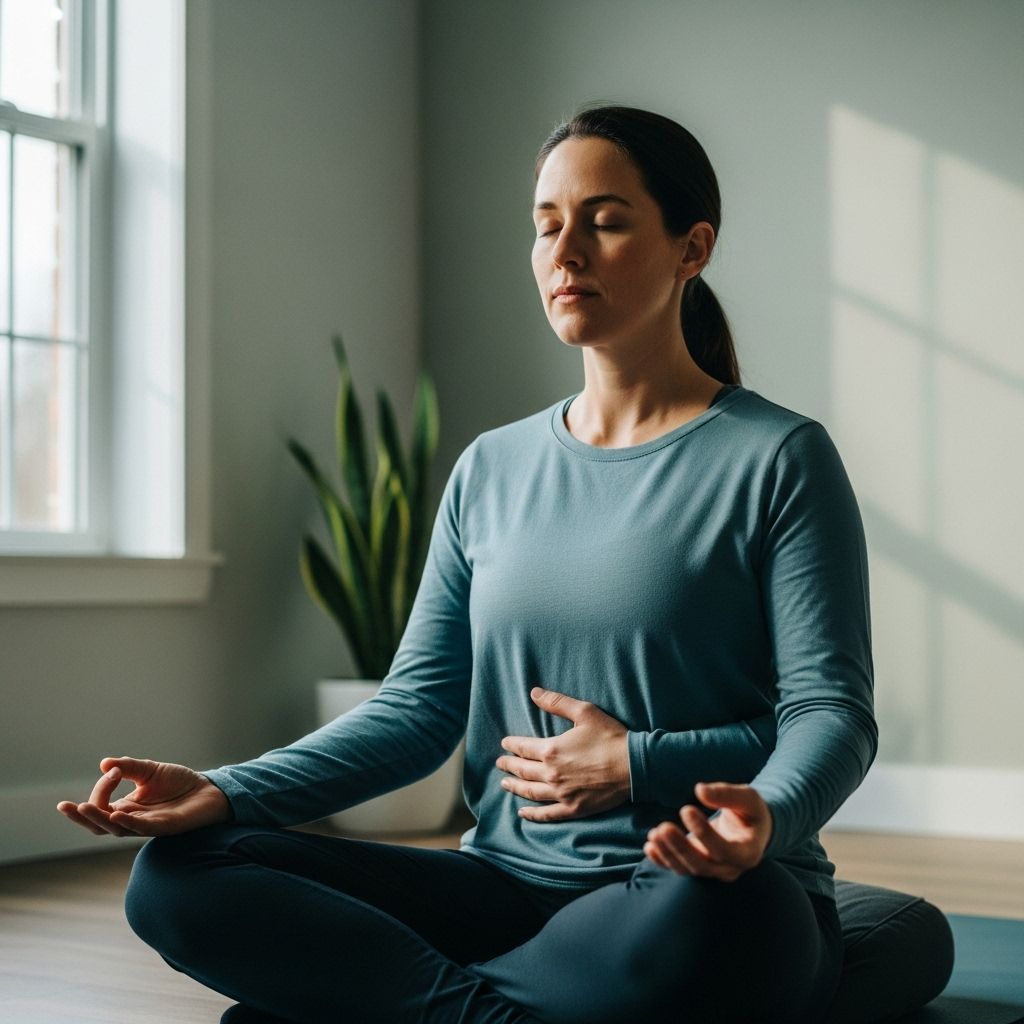Reduce Stress & Anxiety Instantly with Deep Breathing
Use mindful inhale and exhale practices to trigger relaxation and steady your pulse.

Introduction to Stress and Anxiety
Stress and anxiety are common issues in today’s fast-paced world, affecting millions of people globally. These conditions can lead to a range of physical and psychological symptoms, from headaches and fatigue to mood swings and depression. However, there are effective ways to manage stress and anxiety without relying on medication, and one of the most potent tools is deep breathing.
The Science Behind Deep Breathing
Deep breathing, often referred to as diaphragmatic breathing, involves breathing in a way that engages the diaphragm, allowing for a more efficient and deeper inhalation of air. This contrasts with shallow chest breathing, which is common during stress and anxiety. The autonomic nervous system, which controls involuntary actions like heart rate and breathing, is divided into two parts: the sympathetic nervous system (SNS), responsible for the ‘fight or flight’ response, and the parasympathetic nervous system (PNS), which promotes rest and relaxation.
By practicing deep breathing, individuals can enhance parasympathetic activity, effectively reducing stress and anxiety by calming the nervous system.
Key Theories
- Sympathetic vs. Parasympathetic Nervous Systems: Deep breathing helps in modulating the sympathetic nervous system’s response, thereby reducing stress and promoting relaxation.
- Physiological Effects: It leads to lower blood pressure, heart rate, and cortisol levels, contributing to a calmer state.
- Psychological Benefits: Enhances mood, reduces anxiety and depression, and improves sleep quality.
Techniques for Deep Breathing
There are several techniques that can be used to practice deep breathing, each with its unique benefits and applications.
1. Diaphragmatic Breathing
This involves breathing with the diaphragm, feeling the belly rise and fall with each breath. It can be practiced lying down or sitting comfortably.
2. 4-7-8 Breathing Technique
Inhale through the nose for four counts, hold for seven counts, and exhale through the mouth for eight counts. This technique is known for its calming effects.
3. Cyclic Sighing
This involves long exhalations, which can help reduce anxiety and improve mood. It emphasizes relaxation and can be particularly effective for those experiencing stress.
4. Mindfulness Breathing
Focus on the breath, observing its sensation and movement without judgment. This helps in cultivating mindfulness and reducing mental chatter.
Benefits of Deep Breathing
Deep breathing offers numerous benefits for physical and mental health, including:
- Stress Reduction: Helps in calming the nervous system and reducing stress hormones like cortisol.
- Anxiety Management: Reduces feelings of anxiety and fear by promoting relaxation.
- Health Improvements:
- Lower Blood Pressure: Regular deep breathing can help in stabilizing blood pressure.
- Improved Sleep: Enhances sleep quality by reducing stress and promoting relaxation.
- Enhanced Immune Function: Helps in improving immune response by reducing stress.
mực of Deep Breathing
While deep breathing can offer immediate relief, it also contributes to long-term well-being by:
- Improving Mental Clarity: Enhances focus and concentration by reducing stress and anxiety.
- Promoting Emotional Balance: Helps in managing mood swings and emotional responses.
- Supporting Physical Health: Contributes to better heart health and immune function.
How to Incorporate Deep Breathing into Your Life
To make deep breathing a part of your daily routine, consider the following tips:
- Start Small: Begin with short sessions and gradually increase the duration.
- Find a Quiet Space: Identify a peaceful place where you can practice without distractions.
- Consistency is Key: Regular practice is essential for long-term benefits.
- Combine with Other Practices: Pair deep breathing with meditation or yoga for enhanced effects.
Frequently Asked Questions
Q: Is deep breathing effective for everyone?
A: Yes, deep breathing can be beneficial for most people. It is a natural and accessible technique to manage stress and anxiety.
Q: How often should I practice deep breathing?
A: Aim to practice deep breathing at least once a day, ideally in regular sessions throughout the day to maintain consistent benefits.
Q: Can deep breathing help with pain management?
A: Yes, deep breathing can help reduce pain by promoting relaxation and reducing stress responses that can exacerbate pain.
Q: Are there any side effects of deep breathing?
A: Generally, deep breathing is safe and does not have significant side effects. However, it may cause dizziness in some cases due to rapid changes in breathing patterns.
References
- https://rightasrain.uwmedicine.org/mind/stress/why-deep-breathing-makes-you-feel-so-chill
- https://pubmed.ncbi.nlm.nih.gov/27995346/
- https://www.uhhospitals.org/blog/articles/2024/02/breathe-your-way-to-better-health-and-less-stress
- https://www.heart.org/en/healthy-living/healthy-lifestyle/stress-management/breathing-brings-benefits-infographic
- https://med.stanford.edu/news/insights/2023/02/cyclic-sighing-can-help-breathe-away-anxiety.html
- https://pmc.ncbi.nlm.nih.gov/articles/PMC10741869/
- https://www.dignityhealth.org/articles/deep-breathing-techniques-can-relieve-your-stress
- https://www.bhf.org.uk/informationsupport/heart-matters-magazine/wellbeing/breathing-exercises
- https://my.clevelandclinic.org/health/articles/9445-diaphragmatic-breathing
Read full bio of Sneha Tete












